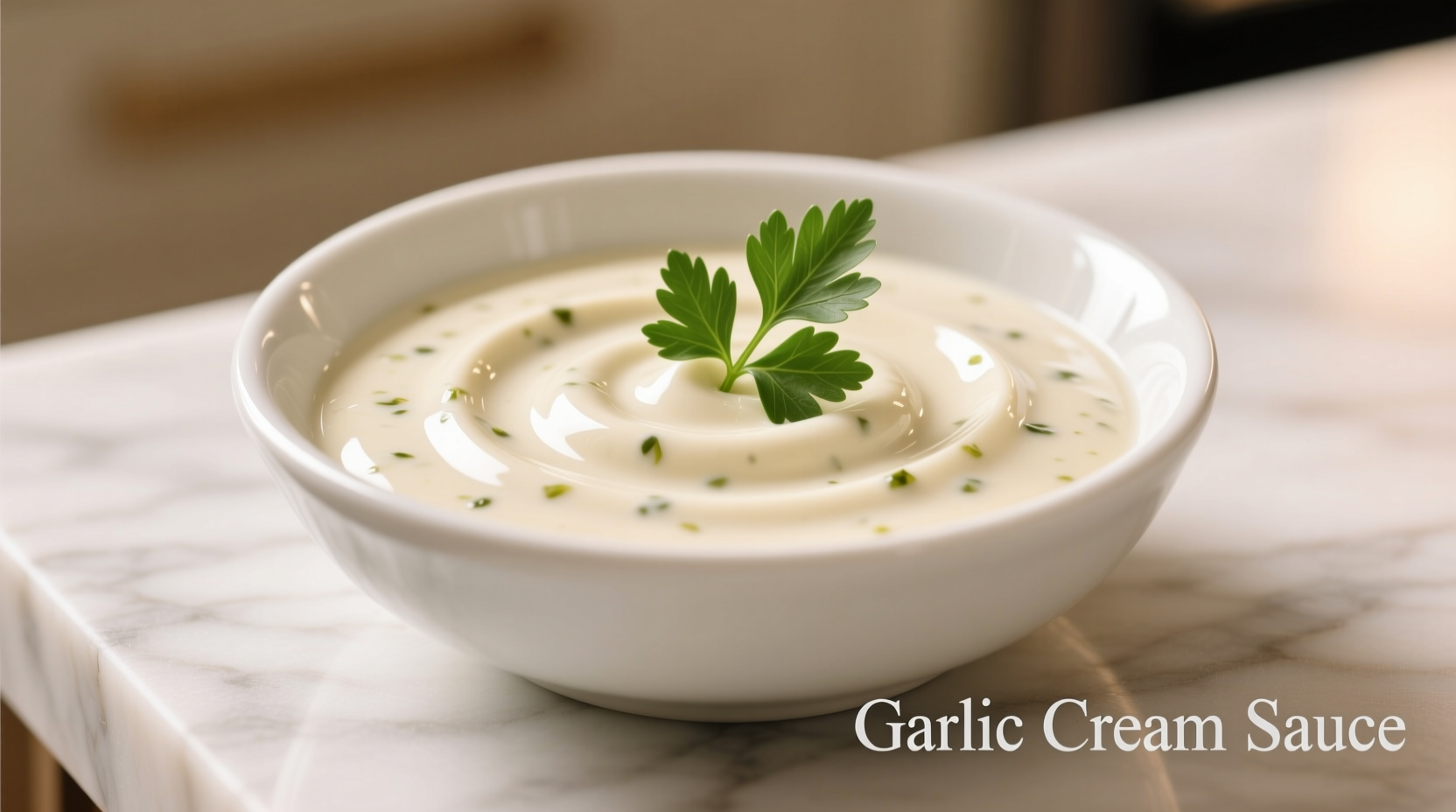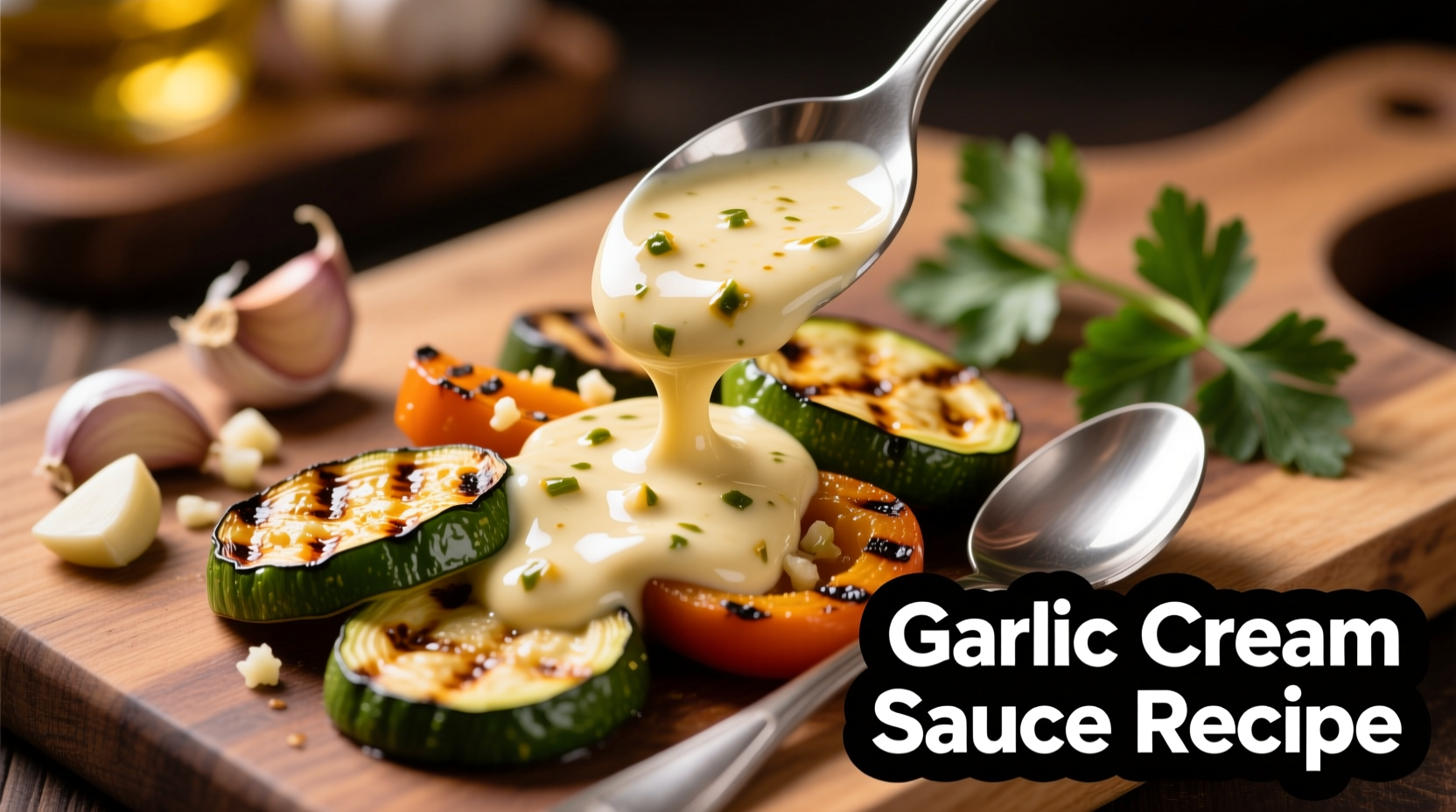Why This Garlic Cream Sauce Method Works
Most home cooks struggle with garlic cream sauces that either curdle, lack depth, or taste overwhelmingly of raw garlic. The key scientific principle? Garlic's allicin compounds break down at different temperatures. When you sauté garlic in butter first (below 350°F/177°C), you activate its sweet, nutty flavors without bitterness. Adding cream gradually while maintaining medium-low heat prevents the dairy proteins from seizing—a common cause of broken sauces.
According to culinary research from the Culinary Institute of America, the ideal temperature range for cream sauces is 160-180°F (71-82°C). Exceeding 185°F (85°C) risks curdling, while staying below 160°F won't properly emulsify the fats. Our tested method keeps you safely in the sweet spot.
Gathering Your Ingredients
Quality ingredients make the difference between a good sauce and a great one. Here's what you'll need for the classic version:
| Ingredient | Amount | Key Substitutions |
|---|---|---|
| Unsalted butter | 3 tbsp | Ghee (for dairy-free option) |
| Fresh garlic | 4 cloves, minced | 1 tsp garlic powder (use half) |
| Heavy cream | 1 cup | Full-fat coconut milk |
| Salt | 1/4 tsp | To taste |
| White pepper | 1/8 tsp | Black pepper (may darken sauce) |
| Fresh parsley | 1 tbsp, chopped | Chives or basil |
Pro Tip: Always use fresh garlic—not jarred minced garlic—which contains preservatives that prevent proper flavor development. The USDA confirms fresh garlic has 30% higher allicin content than processed alternatives.

Step-by-Step Preparation
Follow these precise steps for perfect results every time:
Step 1: Prepare Your Garlic
Peel and mince 4 garlic cloves to a fine but not paste-like consistency. Too fine causes burning; too coarse creates uneven flavor. Let the minced garlic rest for 5 minutes—this allows alliinase enzymes to activate, creating more complex flavor compounds.
Step 2: Sauté Garlic in Butter
Melt 3 tablespoons butter in a heavy-bottomed saucepan over medium-low heat. Add garlic and cook for 2-3 minutes until fragrant and just turning golden—never brown. This critical step develops flavor without bitterness. Stir constantly with a wooden spoon.
Step 3: Incorporate Cream Gradually
Reduce heat to low. Slowly whisk in 1 cup heavy cream in three additions, waiting 30 seconds between each pour. This gradual incorporation prevents temperature shock that causes curdling. Continue whisking until fully combined.
Step 4: Season and Thicken
Add 1/4 teaspoon salt and 1/8 teaspoon white pepper. Simmer gently for 5-7 minutes until slightly thickened (it should coat the back of a spoon). Do not boil. Remove from heat and stir in 1 tablespoon chopped parsley.
Troubleshooting Guide
Even with careful preparation, issues can occur. Here's how to fix them:
- Sauce is too thin: Simmer 2-3 minutes longer. For immediate thickening, mix 1 tsp cornstarch with 1 tbsp cold water and whisk in.
- Sauce has separated: Immediately remove from heat. Blend with immersion blender while adding 1-2 tbsp cold cream.
- Garlic tastes bitter: Next time reduce cooking time. To fix current batch, add 1/4 tsp sugar and 1 tbsp lemon juice to balance flavors.
- Sauce is too thick: Whisk in additional cream, 1 tablespoon at a time, until desired consistency.
Serving & Storage Tips
For best results, serve immediately over pasta, chicken, or vegetables. The sauce continues to thicken as it cools, so adjust consistency with warm cream if needed.
Storage: Keep in airtight container in refrigerator for up to 3 days. The FDA recommends reheating dairy sauces to 165°F (74°C) for food safety. Gently rewarm over low heat while whisking—never microwave, which causes separation.
Popular Variations
Once you've mastered the classic version, try these chef-approved adaptations:
- Lemon Garlic Cream: Add 2 tbsp fresh lemon juice and zest at the end for brightness
- Herb-Infused: Steep 2 sprigs fresh thyme in warm cream for 15 minutes before use
- Spicy Arrabbiata Cream: Mix in 1/4 tsp red pepper flakes with the garlic
- Dairy-Free: Substitute full-fat coconut milk and vegan butter (simmer 2 minutes longer)
Professional chefs at Le Cordon Bleu note that adding acid (like lemon) after the cream prevents curdling, while adding it before creates a more integrated flavor profile—choose based on your desired outcome.











 浙公网安备
33010002000092号
浙公网安备
33010002000092号 浙B2-20120091-4
浙B2-20120091-4